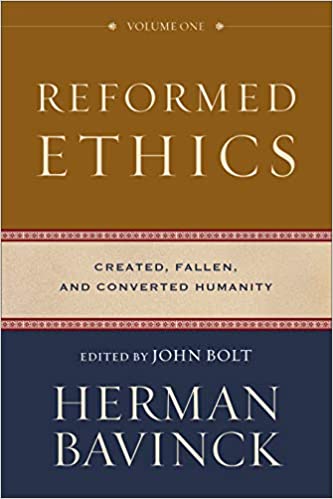A Brief Book Summary from Books At a Glance
by Steve West
About the Author
Herman Bavinck (1854-1921) was an important theologian, professor, and author in the Dutch-Calvinistic tradition. Today he is best known for his multi-volume Reformed Dogmatics, but Reformed Ethics is also a significant and influential addition to the field of ethics from a Reformed perspective.
Table of Contents
Introduction
1 Essential Human Nature
2 Humanity under the Power of Sin
3 The Self against the Neighbor and God
4 The Fallen Image of God
5 Human Conscience
6 The Sinner and the Law
7 Life in the Spirit
8 Life in the Spirit in the Church’s History
9 The Shape and Maturation of the Christian Life
10 Persevering in the Christian Life
11 Pathologies of the Christian Life
12 Restoration and Consummation of the Christian Life
Summary
Chapter 1: Essential Human Nature
“How we must live is determined by our answers to fundamental questions of our origin, purpose, and destiny.” Christianity, not Darwinism or Pantheism, is required for ethics. God is good, and he made us good: we must be good to do good. Adam was able to be good because he was good, and in the Second Adam, we who are corrupted in sin are restored to goodness and righteousness. When ethics tries to move us from the material to the spiritual or from below to above, it fails to be biblical; we do not become good through our own process of self-determination. At the heart of human nature is the fact that we are the image bearers of God. As such, we always stand in relationship to God, and human nature is inconceivable apart from this theological and metaphysical truth. We are integrated unities of body, soul, and spirit, with a first-person consciousness that thinks, knows, wills, and acts.
Human beings stand in a fundamental and inescapable relationship to God, other people, and to nature. Our relationship to God is the sphere of religion, and our relationship to people is the sphere of morality. To understand religion, we do not bring all religions together, but rather we accept Christianity. Religion has both an objective givenness of truth, and a component of subjective response in belief and trust. Our relationship with God is to control our thinking and behavior in every sphere of life. Our relationships as members of the human race begin even before our birth and center in the first instance on our family. Religion and morality may be distinguished, but the latter is dependent on the former and is to be guided by it. In both spheres, our standard is the Word of God. The Decalogue is one law, but it has two foci of emphasis, the first being our walk with God and the second being our moral connections with other people. Fully separating religion and morality, or collapsing them into one, destroys a proper understanding of both. Morality apart from God is impossible, and religion reduced to morality is eviscerated. Sabbath should affect every day of the week, but the fulfillment of Sabbath awaits the eschatological consummation. . . .
[To continue reading this summary, please see below....]The remainder of this article is premium content. Become a member to continue reading.
Already have an account? Sign In
